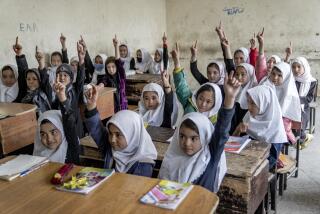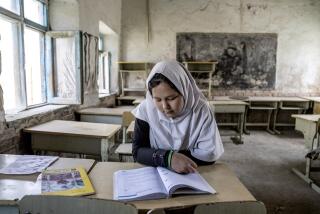Harsh Life Steals Childhood Pleasures in Bangladesh
- Share via
DHAKA, Bangladesh — Thousands of Bangladeshi children are forced every year into menial jobs, crime and prostitution despite government efforts to school and train homeless youngsters.
In one of the world’s poorest countries, large numbers of children are abandoned by their parents because of poverty or broken marriages.
Thousands die from malnutrition and disease.
Juvenile domestic workers are even tortured by wealthy women who draw applause in public by working for children’s welfare, officials say.
“The joys of childhood are fleeting in poverty-stricken Bangladesh, and the situation is unlikely to improve soon,” said Salma Sulatana, who works at a children’s home near Dhaka.
The official minimum working age is 15. However, many children begin the drudgery of long hours for low wages as young as 7 or 8.
Nearly 40 million of Bangladesh’s 110 million people are child laborers, helping their fathers on farms, working as porters, rickshaw pullers, cobblers or brick-breakers at construction sites.
President Hussain Mohammed Ershad has launched a campaign to organize street children.
Calling homeless and abandoned children pathakalis , or “street flower buds,” he has set up schools to provide elementary education and training in various trades.
Nearly 10,000 child laborers have enrolled in the schools in Dhaka and other cities, officials said.
However, Manpower Ministry officials described the aid as insignificant compared to the numerous problems faced by the country’s underage workers.
“There is little hope the situation will soon change,” said one official who declined to be identified.
Youngsters in Dhaka are frequently forced into full-time work at a tender age to feed themselves and their families.
Abdus Subhan, 13, works in a restaurant in the Nawabpur district for free food and 70 cents a week.
“We have no land, no home and no one to take care of us,” he said.
Other children working in a galaxy of low-priced eateries around the capital come from similar backgrounds. Their employers blame the situation on socioeconomic conditions.
“How much we can help? They have been born on the wrong side of the world,” said Abul Bashar Mridha, owner of a small restaurant in Nawabpur.
Mridha, 35, said his own childhood was not a pleasant one.
“I worked on the street,” he said. “At least they have a shelter over their heads.”
Abdus Sattar is 13 and peddles a rickshaw from dawn to dusk in the traffic-choked Dhaka streets. His 10-year-old brother breaks stone and bricks at a high-rise construction site in the city’s Motijheel commercial district.
Together they earn about $2 a day, not enough to keep their seven-member family in the slum that is their home.
An average 10-year-old girl in the countryside must work in the home for 40 hours a week while both parents are out earning a living, said a survey by the government’s social welfare department.
The government says the children’s problems can be blamed at least partly on the high, 2.4% annual population growth rate, and the flood into cities of hundreds of thousands of villagers made homeless by floods, river erosion and other natural disasters.
“We are trying within our limited resources and power to reduce the number of child workers,” Vice President Maudud Ahmed said. “But people wanting more children than they are capable of feeding simply don’t care.”
Most Bangladeshis are Muslim and believe contraception brings a divine curse.
Up to 5,000 young Bangladeshi girls are sold abroad by human traffickers every year. Many of them end up in brothels in India and Pakistan, police said.
Hena Begum, 14, of the eastern Brahmanbaria district was taken to Pakistan two years ago by her husband, who told her family he had found a job there.
Since her parents were dead, relatives let her go. Last month her uncle received a letter from her in Karachi, saying she had been sold into a brothel.
Hundreds of cases involving torture and abuse of children remain hidden in complaint books in the government’s social and women’s affairs departments.
“We have neither the logistics nor the manpower to investigate and draw up charges in all the cases. We are simply drowned under piles of paper,” one official said.
Complaints range from the raping of housemaids to the beating of servants with heated iron rods.
“It’s very painful that people who call for ending cruelty to children at public rallies are often so cruel behind their own doors,” the official said.
More to Read
Sign up for Essential California
The most important California stories and recommendations in your inbox every morning.
You may occasionally receive promotional content from the Los Angeles Times.













